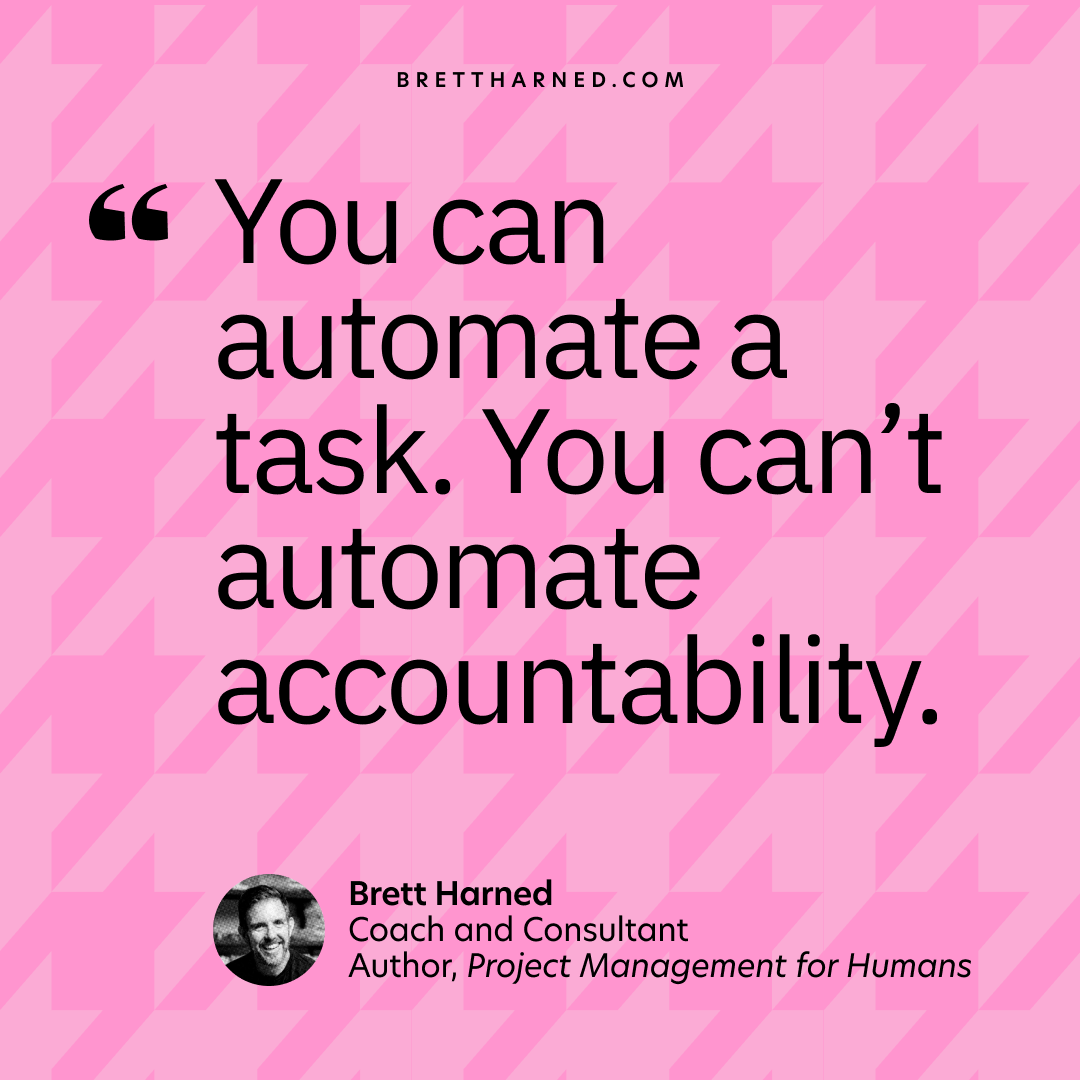You can automate a task, but you can’t automate accountability

I recently worked with a team that couldn’t seem to deliver projects on time or within budget.
They were smart people with clear goals, a solid process, and a suitable toolset. On the surface, everything looked fine. But deadlines kept slipping, conversations looped in circles, and the same issues appeared on every retro like a rerun nobody asked for.
It wasn’t a process problem; it was an authority problem. The project managers were expected to lead, but they weren’t empowered to do it. They were stuck in the middle, accountable for outcomes they couldn’t fully influence. They saw the risks, named the issues, escalated them, and still, nothing changed.
What I realized was that they were responsible for delivery, but lacked the trust or authority to make it happen. And that isn’t just frustrating; it’s unsustainable.
Accountability without authority
If you’ve ever been a project manager, you know this tension. You’re tasked with keeping the train on the tracks, but you’re not the one laying the rails. You can see derailment coming a mile away, but you don’t have the authority to slow it down.
So you communicate. You raise flags. You follow up. You document. You remind. You try again. And when it still doesn’t work, it’s somehow your fault for not “holding people accountable.”
That phrase gets thrown around a lot. But how do you hold people accountable when you’ve been given responsibility without permission? Without authority, you’re left chasing buy-in instead of leading, stuck in a loop where every decision is a negotiation and every request feels like a favor.
That, my friends, is the frustration of being a PM without the full understanding and support of executive leadership.

The myth that AI can fix it
After I shared a post about this recently, someone commented:
“PMs are mostly mediocre, bureaucracy perpetuating middle management that AI could easily replace.”
I’ve heard versions of that comment for years from executives, designers, engineers, and sometimes even other PMs. But it always says more about their environment than it does about the role itself.
Yes, AI could probably replace the kind of PM who just updates spreadsheets and tracks deadlines. But that isn’t the kind of project management that makes work better. It certainly isn't the kind of project management I can get behind.
The real value of a project manager lives in the gray space: in the conversations between meetings, the negotiation of expectations, and the human messiness that no tool or system can automate.
So if real PMs struggle to drive accountability because leadership doesn’t empower them, what exactly would AI do differently? Send a firmer Slack reminder? Generate another issue to log in a risk register no one reads?
AI can replicate process. It can’t replicate presence. It doesn’t build trust, inspire ownership, or help a team navigate difficult conversations.
Projects don’t fail because someone missed a deadline. They fail because no one felt responsible enough to meet it, or supported enough to admit they couldn’t.
That isn’t a project management problem; it’s a leadership one.
Authority isn’t control; it’s trust
When I say project managers need authority, I don’t mean they need to be the boss. I mean, they need the kind of trust and support that allows them to lead.
Leaders need to empower their PMs to do what they were hired to do:
- Make decisions when no one else will.
- Raise red flags before it’s too late.
- Call people in, not just call them out.
- Balance accountability with empathy.
- Orchestrate an on-time, on-budget delivery in the face of ambiguity.
And PMs have to earn that trust the hard way. It doesn’t come with the job title or the process; it comes from behavior. From showing up with integrity and composure, even when things go sideways. From proving, over time, that you’ll do what you say you’ll do, and that you’ll have people’s backs while doing it.
That kind of trust takes effort, and it’s exactly what AI can’t replicate. It can mimic decision-making, but not dependability. It can automate communication, but not connection.
Authority isn’t about control; it’s about credibility. And credibility is built, not granted. When it’s missing, the PM doesn’t just lose influence — the team loses its anchor. Without trust, authority has nowhere to stand.
If your project managers are responsible for delivery but struggling to influence outcomes, it’s time to look at how authority and trust work on your team.
I help organizations build systems where PMs can actually lead: with trust, clarity, and accountability that lasts.
Let’s fix the structure and empower your PMs.
The leadership math
Delivery isn’t a formula. It’s a relationship.
If you want things to get done, people have to trust each other. They have to believe that when they commit to something, others will too. That someone is tracking the whole picture, not to micromanage, but to make the work easier.
AI can’t build that, and tools can’t enforce it. Only people can.
When accountability breaks down, it’s rarely because no one knew what to do. It’s because no one felt responsible enough to do it, or safe enough to say they couldn’t. That’s what leadership really is: not assigning tasks, but creating the conditions for accountability to exist.
TL;DR - Projects don’t fail because of bad process or lazy teams. They fail when there’s no trust in who’s steering. AI might automate the tasks, but leadership still requires authority, empathy, and accountability—the human kind that can’t be coded.


Member discussion